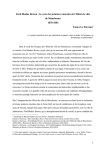Download Extrait du livre
Transcript
Présentation François Gallix Un texte contient toujours en lui-même une notice sur son mode d'emploi Umberto Eco, Poétique de la prose Un des critères de la littérarité d’un texte — concept toujours difficile à bien cerner — est d’offrir au lecteur une multitude de pistes que chacun peut choisir, tout comme l’auteur sans cesse confronté aux sentiers qui bifurquent du jardin imaginaire de Luis Borges, voire de son labyrinthe textuel. Pour The Good Soldier, il suffit d’en énoncer quelques-unes pour embrayer une lecture toujours différente et renouvelée du même roman : une affaire de cœur, la piste indienne, la connexion catholique, le 4 août, l’argent, Histoire/histoires, le génie des lieux, « l’affaire Kilsyte », « the saddest story », « good people », « the (poor) girl ». Plusieurs de ces pistes fructueuses sont ouvertes par Julian Barnes dans sa préface. Lors d’une conférence à Paris IV-Sorbonne le 14 novembre 20011, l’auteur du Perroquet de Flaubert (1984) disait avoir lu une bonne demi-douzaine de fois The Good Soldier qu’il considérait comme l’un des plus grands romans anglais du XXe siècle : « a grand opera narrated by a bumbler. » Estimant que Ford a été trop longtemps négligé par la critique, Barnes pense que The Good Soldier est un exemple parfait de ce qu’un auteur peut faire grâce à une parfaite maîtrise des techniques littéraires de l’écriture, avec « its immaculate use of a ditheringly unreliable narrator, the sophisticated disguise of true narrative behind a false façade of apparent narrative, its deep duality about human motive, intention, and experience, and its boldness as a project. » Il scrute l’incipit, analyse les ressorts les plus dissimulés du roman et en fait apparaître les procédés ludiques. Dans son entrée en matière au titre provocateur très fordien, « Trust me: I’m an introduction », Max Saunders, auteur de la magistrale biographie de Ford Madox Ford, dont le sous-titre : « A Dual Life », donne une interprétation nouvelle de l’écriture impressionniste de l’auteur (voir l’article du TLS, Nov. 1st, 1996), propose une analyse d’un texte qui semble devoir être redécouvert tous les dix ans. En partant des remarques de Ford sur l’impression qu’un écrivain peut donner d’un personnage dès les premiers mots qu’il prononce, Saunders offre un décryptage très serré du récit de Dowell qui dépasse le simple cadre de la diégèse du roman en montrant que son absence de fiabilité « must be made to matter: made to signify something about the limits of our understanding of others. » 1. Pour l'enregistrement, voir www.ercla.paris4.sorbonne.fr. Pour le texte écrit, voir Études Britanniques Contemporaines, 21. Dec. 2001, p. 107-132. 8 I – Ouvertures En abordant la mosaïque textuelle de Ford par le biais du roman angloindien, Jean-Pierre Naugrette démontre qu’il ne saurait y avoir de piste secondaire et que les différents passages vers les Indes empruntés par les personnages principaux donnent un éclairage qui va bien au-delà du simple arrière-plan historique de l’aventure impériale anglaise. Il faut tirer jusqu’au bout ce fil de la trame du texte pour en apprécier pleinement les « traces intertextuelles du Rudyard Kipling des Plain Tales from the Hills », pour découvrir que l’onomastique (le nom de Maisie Maidan) renvoie à Burmese Day de George Orwell et que, « comme plus tard chez Duras, l’Inde chez Ford est moins un territoire qu’un réseau de sonorités ressassées, martelées ou soufflées […] comme dans India Song, la narration fragmentaire de Dowell n’est qu’une voix qui réverbère les actions qu’elle se contente de répercuter sur le mode chorique, comme si elle n’avait pas tout à fait prise sur les événements. » Pour Christine Evain, le texte de Ford Madox Ford n’est pas seulement subversif dans sa stratégie littéraire par sa libération des règles d’autorité désormais plus ou moins acquise au XXIe siècle, mais parce qu’il dynamise le lecteur en l’amenant à dépasser la confusion morale dont fait preuve « l’homme faible » qu’est Dowell, grâce à une réflexion nietzschéenne qui nous conduit à nous construire notre propre système de valeurs : « Incapable du sursaut nietzschéen qui lui permettrait de gagner en lucidité, et par voie de conséquence, de reprendre sa vie en main, le narrateur se contente de laisser le lecteur deviner un malaise qui aurait pu être salutaire, mais dont il ne fera rien, tandis que, par la même occasion, il offre au lecteur la possibilité de percer à jour sa “triste histoire”. » Dans « Entre Perte et figuration : Présence du Corps », Françoise Tusques-Venisse utilise le prisme de la « transsubtantiation » pour faire apparaître l’écriture à la fois moderniste et élégiaque du corps dans le roman. Ce lien particulier entre le narrateur, l’auteur et le lecteur souligne l’omniprésence de la guerre, l’évocation du schisme d’Henry VIII, la « Protestation » de Luther et le Catholicisme. « L’enjeu de The Good Soldier devient ainsi l’enjeu d’une “vérité vraie”, alors même que les faits sont insaisissables, les apparences trompeuses et les perspectives multiples. » Jeremy Tambling suit la trace (au sens de Jacques Derrida) d’un thème que Dowell développe à trois reprises dans son récit : celui du « sex instinct ». Cette piste le conduit à des rapprochements avec Tess, de Thomas Hardy, avec Madame Bovary, les trois essais de Freud sur la sexualité et avec Ophélie dans Hamlet. C’est cet instinct sexuel, refoulé par Dowell, qui justifie ce besoin d’écrire qu’il ne parvient jamais à expliquer lui-même : « What writes indeed, is the sexual instinct; or rather, the text shows the trace of the sex instinct, its markings, its existence as a force within the writing. » Cette trace permet de donner son sens plein à la confession de Dowell : « I can’t conceal from myself the fact that I loved Edward Ashburnham—and that I love him because he was just myself. » (161). Présentation 9 Gene M. Moore décline dans ses mutiples acceptions, le mot « sadness » appliqué à Dowell en partant de son étymologie et de ses associations littéraires : Malory, Chaucer, Shakespeare, Dickens. Il en débusque l’un des motifs dans les nombreuses paralipses où le non-dit est toujours révélateur dans un récit qui mélange l’oralité à l’écriture. Personnage schyzophrène, le narrateur ne peut que rester allusif pour suggérer l’une des raisons de sa tristesse : « Understanding the nature of Dowell’s secret love for Ashburnham may well provide a key to understanding the sadness of his story. » Cet amour est d’autant plus triste qu’il semble être le seul sentiment authentique dont il soit capable et qu’il doit pourtant taire. Marielle Seichepine analyse la longue anamnèse de Dowell et les nombreux jeux avec le temps auxquels il se livre dans sa reconstruction du passé, au gré de ses souvenirs plus ou moins fiables, sur un arrièreplan où plane l’ombre de la guerre et les mystères de la récurrence de la date du 4 août. Dans un récit fragmenté a-chronologique, « le temps représenté consiste en une succession d’impressions, de moments isolés et saillants qu’il appartient au narrateur de relier les uns aux autres. Ainsi, l’attention du lecteur, mise en alerte par une première impression concernant un personnage est ensuite retenue par un “balayage” du passé de ce personnage avec des retours en arrière et des projections en avant. » …it may be difficult for anyone to find their path through what may be a sort of maze […] You have the facts for the trouble of finding them; you have the points of view… (The Good Soldier, p. 119, 120)1 1. Toutes les références sont extraites de l’édition Norton de The Good Soldier, Martin Stannard, éd. Préface Julian Barnes He confused to make it clear The back cover of the old Fifties Vintage paperback of Ford’s The Good Soldier has always made poignant reading. “Fifteen distinguished critics”, it begins, “have subscribed to a single statement concerning this remarkable novel.” Next comes the statement: “Ford’s The Good Soldier is one of the fifteen or twenty greatest novels produced in English in our century.” And then the names, from Leon Edel to Graham Greene, Jean Stafford to William Carlos Williams. There is something both heroic and hopeless about Ford himself. Fifteen critics ought to be better than five, but somehow the number overpleads. Yet the statement remains poignant because you can hear the literary virtue behind it: look we know this guy is good, so will you please read him? Ford has never lacked supporters, but has always lacked readers. In 1929 Hugh Walpole wrote that “there is no greater literary neglect of our time in England than the novels and poems of Ford,” to which Ford replied: “It is just that the public will not read me.” There are various overlapping reasons for this. He presents no usefully crisp literary profile: he wrote too much, and in too many literary genres: he fails to fit easily in university courses. He seems to fall down a hole between late Victorianism and modernism, between a childhood of being dandled by Liszt and seeing Swinburne gambol, to a later career as avuncular facilitator of Pound, Hemingway, and Lawrence. He also presented himself as an elderly party fading out before this new generation, which was probably a bad tactical move. In his 1927 preface to The Good Soldier, he writes of himself as an “extinct volcano”, someone “prepared to stand aside” in favour of the “clamorous young writers”, an old bird who had laid a great Auk’s egg1 in the form of The Good Soldier and was happy to leave it at that. Yet 1927 was the year between the publication of the third and fourth volumes of his other masterpiece, Parade’s End. His bufferish pose was too convincing: Graham Greene wrote that “The death of Ford Madox Ford was like the obscure death of a veteran—an impossibly Napoleonic veteran, say, whose immense memory spanned the period from Jena to Sedan.” Today, Greene seems the more old-fashioned writer of the two. If ambitious novelists should all study The Good Soldier as an example of the possibilities of narrative (how dull that makes it sound), they would also do well to look at Ford’s life as a prime example of negative career management. 1. See Ford’s dedicatory letter to Stella Ford (Norton, p. 4). 12 I – Ouvertures He had the sort of large, soft, bonhomous presence which provoked attack, and also a suffering gentlemanliness which declined to reply (this naturally provoked renewed attack). He quarrelled endlessly with publishers: he regarded them as tradesmen and thought them impertinent for wanting to read his manuscripts before buying them. Even those who admired Ford were often irritated by him. Paul Nash called him “Silenus in tweeds.” Rebecca West said that being embraced by Ford was “like being the toast under a poached egg.” Those who weren’t fond of Ford were more than irritated. Hemingway—whom Ford had made the mistake of promoting— denounced him to Stein and Koklas as “an absolute liar and crook always motivated by the finest synthetic English gentility.” Once, when he was near Philadelphia, Ford applied to see the Barnes Collection. Admittedly (if characteristically) he made his approach through the wrong person; but tactical maladroitness alone cannot account for the ferocity of Dr. Barnes’s telegram from Geneva: “Would rather burn my collection than let Ford see it.” He changed his name from Hueffer to Ford: he changed his country of domicile more than once; he was more ambitious for literature than for himself. Even so, it is strange how completely he fails to blip on certain radar screens. Edmund Wilson scarcely mentions him in his journals and criticism; Virginia Woolf and Orwell are silent. Waugh never mentions him. This Ford-forgetfulness continues; not very long ago, I had a conversation with an American writer friend about The Good Soldier which broke down when he said he’d always found the book’s humour deeply irritating. Having never found more than grim and sarcastic ironies in the novel, I was perplexed by this objection. Finally, it emerged that my friend thought that we were talking about Schweik (and no, he hadn’t read The Good Soldier either). The English critic Cyril Connolly, in his book The Modern Movement1 , praised The Good Soldier with idle words about “its energy and intelligence”. Looked at now, the novel barges its way into the modernist club for very different reasons: its immaculate use of a ditheringly unreliable narrator, the sophisticated disguise of true narrative behind a false façade of apparent narrative, its self-reflexiveness, its deep duality about human motive, intention, and experience, and its sheer boldness as a project. Greene wrote in 1962: “I don’t know how many times in nearly forty years I have come back to this novel of Ford’s, every time to discover a new aspect to admire.” Take that famous entence, one of high plagency and enormous claim: “This is the saddest story I have ever heard.” The first part of the sentence takes our attention, and rightly so. It cannot logically be until the second reading (and it may not be until the third or fourth) that we note the falsity of the final word. Because it’s not a story the narrator has “heard”. It is one in which he has participated, has been right up to his neck, heart and guts in: he’s the one telling it, we’re the ones hearing it. 1. Cyril Connolly. The Modern Movement: 100 Key Books from England, France and America (18801950). London: Deutsch, 1965. The Good Soldier is the entry for 1915. Préface 13 He says “heard” instead of “told” because he’s affecting distance from his “tale of passion”, declining to admit complicity. And if the second verb of the first sentence of the book is unreliable—if it gives a creak under the foot as we put our weight on it—then we must be prepared to treat evey line as warily: we must prowl soft-footed through the text, alive for every board’s moan and plaint. This is a novel about the human heart. It says so on the first page. Yet the word is set differently in its first two appearances, once plainly, once between quotes1 . When is a heart not a heart? When it’s a medical condition, a “heart”. Ford plays for a while with this separation of meaning. We might expect that having a “heart” means the affairs of the heart are off-limits. But this is a false façade: it seems that the two characters who are at Nauheim for medical purposes—Florence Dowell and Edward Ashburnham himself—are the very two who are indulging their un-quote-marked hearts; while the two healthy onlookers, Dowell and Leonora Ashburnham, are the two with a different sort of heart trouble—hearts which are cold or killed. However, this paradox turns out to be a second false façade: Florence’s “heart” is a fake, a got-up condition to keep her husband out of her bedroom; while later on we learn (or seem to learn—there is a lot of seeming to learn in this novel) that Ashburnham doesn’t have a “heart” either: the Ashburnhams are in Nauheim because of Maisie Maidan, whom they have brought to the spa from India for treatment. She—Maisie—is (or seems to be) the only character in the novel who has a heart in both the amatory and the medical senses of the word. Not surprisingly, she is soon to die. So the novel’s ordinary language reveals its strategy. It plays with the reader and it reveals and conceals truth. And part of Ford’s achievement is to find the perfect voice for paradoxical narrative. He gives us a bluff, know-nothing narrator, one who forgets to tell us his name until the book is nearly over, who seems in his bumbling way to have spoiled his story in the second page by revealing that two of the main characters are dead. He uses an armchair bore to tell a story of great subtlety; also one of deep emotional cruelty and pain. He deploys the natural narrative tropes and forgettings of a bad narrator to enrich the narrator, delay our unserstanding, and finally deliver to us the whole (or wholeish) picture: in other words, he makes good narrative out of bad. Could Ishiguro2 write as he does without the example of The Good Soldier? Ford also plays relentlessly on the reader’s desire to trust the narrator. We want—or want to want—to believe what we are told, and dummylike we fall into every pit dug for us. Even when we know we can’t trust Dowell, we carry on doing so, to our cost. This trustingness before narrative recidivism has its counterpart within the novel, in Leonora’s trustingness before Ashburnham’s sexual recidivism. Of course, it is our own “fault” as readers: the hazard warnings are plain enough.“My wife and I knew Captain and Mrs. Ashburnham as well as it was possible to know anybody, and yet, in another sense, we knew nothing at all about 1. 2. Norton, p. 9, 10. See Kazuo Ishiguro. The Remains of the Day. London: Faber and Faber, 1989. 14 I – Ouvertures them 1 .” “Was that last remark of hers the remark of a harlot, or is it what every decent woman […] thinks at the bottom of her heart2 ?” “Is all this digression or isn’t it digression3 ?” Such items from the opening pages are more than indicators of Dowell’s candid indecisiveness. They establish the switchback rhythm of the whole book: they set up the pulse, the paradox, and the dualism of the story. Time and again a seemingly ordinary sentence will have contradicted itself by its end; there are sentences beginning with “And” which offer no continuation from the previous sentence, but rather a denial; there are false abuttings and leaky grammatical joints. Ford also uses the “impossible” verb tense: “Supposing that you should come upon us sitting together”, Dowell says, when such a coming-upon could only have happened in the past. So the prose’s dividedness points us directly to the towering either/ors of the story: Ashburnham as good soldier or plundering shit; Leonora as marital martyr or vengeful destroyer; the narrator as honest misprisoner or complicit evader, timid domestic dormouse or repressed homosexual swooner over Edward Ashburnham; and so on. There is the wider dividedness between social face and inner urging; between emotional expectation and emotional reality; between Protestant and Catholic (this part of the story seems artificial or underworked: it’s as if the Catholic element is mainly introduced to produce women of exceptional innocence and marital adhesiveness—and thus up the ante when they face the complexity and wiles of sex). Beyond this, the dividingness of the personality between the conscious and unconscious mind. And beyond all this, the realization that the answer to either/or may not be one or the other—is Ashburnham a deep sentimentalist, as Dowell constantly, indeed infuriatingly, insist, or a ruthless sexual predator?—but both. At the end of the novel, Nancy Rufford briefly emerges from deep madness to utter the word “Shuttlecocks4”, which is understood as a brief lucid memory of how she felt she had been treated by the Ashburnhams. It is also the way the reader has been treated, soaring high between violent opposing bashes. Ford’s masterpiece is a novel which constantly asks how to tell a story, which pretends to fail at narrative while richly succeeeding. It also openly doubts what we easily think of as character. “For who in this world can give anyone a character,” Dowell asks at one point of Ashburnham (typically, there is a creak of the floorboard here as well: “give someone a character” offers the sense “to describe;” but also that of “give the social thumbs-up to”). Dowell’s answer to his own questions is: “I don’t mean to say that one cannot form an average estimate of the way a person will behave. But one cannot be certain of the way any man will behave in every case—and until one can do that a ‘character’ is of no use to anyone.” Ford later refined and improved this line in The New Humpty Dumpty5 , where it comes from the Duke of Kintyre’s mouth: “‘Any man,’ 1. 2. 3. 4. 5. Norton, p. 9. Norton, p. 13. Norton, p. 17. Norton, p. 160. Ford Madox Ford. The New Humpty Dumpty (1912). Préface 15 he said slowly, ‘is any sort of man, some time or another, you know.’” Ford’s approach is to get at character—and more widely, truth—not just indirectly or contradictingly, but often by way of ignorance. As V. S. Pritchett put it: “Confusion was the mainspring of his art as a novelist. He confused to make it clear.”
















